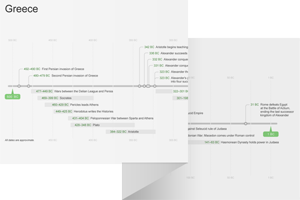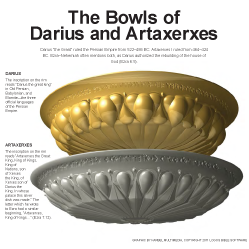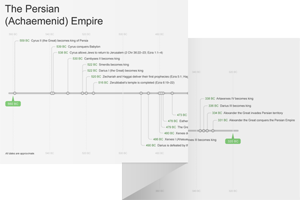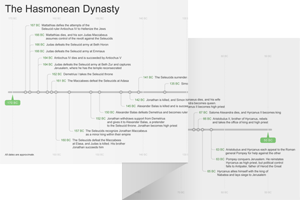11:1–45 This section outlines the succession of kings during the transition period from Persian dominance to Greek dominance—represented by the third and fourth beasts of Dan 7, and the ram and goat in ch. 8. The struggle for control of Palestine between the rival Hellenistic Greek kingdoms of the Ptolemies and Seleucids also receives attention. The career of the little horn of chs. 7–8 also receives greater detail. All of these events were experienced by the Jewish people after Daniel’s lifetime. |
11:2 Still three kings The identities of the three kings (in addition to Cyrus; see 10:1) are uncertain. They may be Darius, Xerxes (also known as Ahasuerus), and Artaxerxes.
the fourth Likely Darius III Codomannus (336–330 bc). This king could alternatively be Xerxes I, but the connection with the fall of Persia to Alexander in the next verse makes Darius III more likely.
will get abundance and great wealth Reflective of the greatness of the Persian Empire.
11:3 a mighty king Alexander. The Hebrew phrase here can be translated as “warrior king,” which describes well the career of Alexander.
The Hebrew phrase here can be translated as “warrior king,” which describes well the career of Alexander.
he will do as he pleases Refers to unstoppable power. Alexander, Antiochus III the Great, and Antiochus share this trait.
11:4 , his kingdom See 8:8 and note.
not to his posterity Alexander’s kingdom was passed to his generals, not his children.
11:5 the king of the south Ptolemy I, who gained control of Egypt following the death of Alexander.
who gained control of Egypt following the death of Alexander.
one of his officials Seleucus I began to govern Babylon began after Alexander’s death but was forced out by Antigonus,
began to govern Babylon began after Alexander’s death but was forced out by Antigonus, another one of Alexander’s generals. He later regained control of Babylon and expanded his empire to include Syria and Media.
another one of Alexander’s generals. He later regained control of Babylon and expanded his empire to include Syria and Media.
a dominion greater than Once Seleucus established his kingdom, he grew stronger than Ptolemy.
11:6 they will make an alliance Seleucus’ grandson, Antiochus II, married Ptolemy’s granddaughter, Bernice. Unfortunately, Antiochus II was already married.
married Ptolemy’s granddaughter, Bernice. Unfortunately, Antiochus II was already married.
she will not retain her position of power Antiochus II and Bernice had a child, but Antiochus reconciled with his former wife, Laodice. She poisoned him and was also responsible for the deaths of Bernice, her child, and her entourage.
11:7 a branch from her roots Bernice’s brother, Ptolemy III, successfully attacked the Seleucids.
successfully attacked the Seleucids.
11:8 their gods See Dan 1:2 and note.
11:9 he will come into the kingdom of The son of Laodice, Seleucus II, reclaimed what Ptolemy III took.
reclaimed what Ptolemy III took.
11:10 “But his sons will wage war Seleucus III and Antiochus III.
and Antiochus III. The latter became a mighty force from 223–187 bc.
The latter became a mighty force from 223–187 bc.
11:11 the king of the south will become furious Ptolemy IV countered Antiochus III and defeated him at Raphia in 217 bc.
countered Antiochus III and defeated him at Raphia in 217 bc.
11:13 the king of the north will again raise From 212–205 bc, Antiochus III conducted many successful campaigns. He eventually gained full control of Judaea in 200 bc at the Battle of Paneas (the city called Caesarea Philippi in the New Testament).
11:14 will rise up against the king of the south Philip V of Macedon joined forces with Antiochus III to crush Egypt and the Ptolemaic dynasty.
joined forces with Antiochus III to crush Egypt and the Ptolemaic dynasty.
the violent ones of your people May refer to Jewish supporters of the Seleucids. When Judaea slipped back into Ptolemaic control due to the efforts of general Scopas (prior to the battle at Paneas), the Seleucid sympathizers’ vision failed. However, Antiochus III would ultimately win at Paneas.
due to the efforts of general Scopas (prior to the battle at Paneas), the Seleucid sympathizers’ vision failed. However, Antiochus III would ultimately win at Paneas.
11:15 capture a city of fortifications Antiochus III pursued general Scopas following the battle of Paneas. He overtook him at Sidon and captured the city.
11:16 the beautiful land Antiochus III was well received in Jerusalem (see 8:9 and note).
complete destruction will be in his power The Seleucids remained in control. From this line came Antiochus IV, who caused widespread destruction.
11:17 will form an agreement Antiochus III betrothed Cleopatra I, his daughter, to Ptolemy V as a peace settlement.
as a peace settlement.
the daughter of women A designation of praise.
to destroy Antiochus III had hoped that he could manipulate Cleopatra I and use her to bring down the Ptolemaic house. She was, however, loyal to her husband and influential in the Egyptian court.
11:18 to the coastlands Refers to Greece. Rome warned Antiochus III to leave Greece alone, but he did not listen.
Rome warned Antiochus III to leave Greece alone, but he did not listen.
a commander The Roman Lucius Cornelius Scipio. Antiochus III lost two decisive battles to Scipio at Thermopylae (191 bc) and Magnesia (190 bc).
11:19 he will stumble and he will fall Rome imposed heavy tribute upon Antiochus III as a result of his Greek adventures. In an effort to pay, Antiochus III attempted to sack the temple of Bel at Elymais and was killed in 187 bc.
11:20 in his place will arise Refers to Seleucus IV, the son of Antiochus III.
the son of Antiochus III.
an official Refers to Heliodorus, who was sent to the Jerusalem temple to confiscate its treasury (see 2 Maccabees 3).
but not in anger and not in battle Seleucus IV was killed in 175 bc as a result of a plot hatched by Heliodorus.
11:21 a despicable person Antiochus IV (see Dan 7:8 and note).
(see Dan 7:8 and note).
they have not conferred the majesty of the kingdom See 7:24 and note.
11:22 the leader of the covenant Likely refers to the high priest Onias III, who was murdered in the time of Antiochus IV (see 9:26 and note).
11:23 an alliance is made with him See 9:27 and note.
with few people Probably a reference to Greek sympathizers among the Jews. Those who desired to remain faithful to their Jewish roots far outweighed those who desired to embrace Greek culture.
11:24 the rich parts of the province Antiochus’ standard operating procedure was, after infiltrating the wealthiest ranks of society and garnering their support, to be generous to them—almost to a fault.
11:25 he will stir up his power For the events of vv. 25–28, see 1 Maccabees 1:16–24.
the king of the south Ptolemy VI. Antiochus attacked Egypt in 170 bc.
Antiochus attacked Egypt in 170 bc.
11:26 those who eat of his royal rations Ptolemy VI, who was a boy when Antiochus attacked, was poorly influenced by his two advisors, Eulaeus and Lenaeus.
11:27 they will speak lies Ptolemy VI’s mother was Cleopatra Syra, Antiochus’ sister. Ptolemy agreed to meet with his uncle in Memphis. Antiochus IV feigned friendship and allegedly took control of his nephew’s kingdom.
still an end is coming at This is not the end. As is typical in apocalyptic literature, events have a predetermined course that cannot be altered (see Dan 9:24 and note).
11:28 against the holy covenant On his way back from Egypt, Antiochus was short on funds and plundered the gold of the Jerusalem temple.
he will take action Antiochus influenced his nephew, Ptolemy VI, to control Egypt.
11:29 he will return Antiochus IV invaded Egypt for a second time in 168 bc.
11:30 the ships of Kittim A Roman envoy. The Roman consul Popillius Laenas stipulated that Antiochus IV must withdraw from Egypt or face the Roman army. He allegedly drew a circle in the sand around Antiochus, and he was not allowed to leave the circle until he responded. Knowing that he could not defeat Rome, Antiochus complied. Humiliated and enraged, he headed home seeking an outlet for his wrath.
against the holy covenant The Jerusalem temple became the target for his wrath (see v. 31).
11:31 they will abolish the regular burnt offering See 8:11 and note.
the abomination that causes desolation See 8:13 and note.
11:32 and will take action Probably does not refer to the Maccabean revolt. Daniel never unambiguously endorses the revolt; rather, he prefers the instructive methodology of the wise men (see v. 33).
11:33 those who have insight Refers to wise men who taught the apocalyptic wisdom of Daniel and lived righteously in the midst of turmoil. The language is borrowed from Isaiah’s “Suffering Servant” motif (see 12:3; Isa 52:13; 53:11).
by sword and by flame Many were killed during Antiochus’ reign because of their refusal to comply with his policies; see 1 Maccabees 1:62–63.
11:34 they will receive little help Probably a veiled reference to the Maccabees, who relied on armed resistance rather than the wise men’s approach to suffering and injustice. Daniel apparently thought little of responding to conflict with conflict (see Dan 11:32).
rather than the wise men’s approach to suffering and injustice. Daniel apparently thought little of responding to conflict with conflict (see Dan 11:32).
11:36 will do as he pleases This verse presents a divergence between the various options for identifying the four kingdoms discussed in ch. 7 (see 7:3 and note). Up to this point, the historical events in the vision are quite clear. However, some hold that from here the text is no longer talking about Antiochus IV, but a later antichrist figure (see 7:8 and note). It is difficult to reconcile the events of vv. 36–45 with the life and reign of Antiochus IV. On the other hand, the text presents no change in characters or leadership.
he will speak horrendous things See 7:8, 11, 20, 25; 8:11, 25.
until the period of anger Refers to the length of his reign and wrath against Israel.
11:37 he will consider himself great over all Antiochus’ surname (“Epiphanes”) means “manifest.” He considered himself to be a god in the flesh.
surname (“Epiphanes”) means “manifest.” He considered himself to be a god in the flesh.
11:38 the god of fortresses If this refers to Antiochus IV, it may indicate his rededication of the Jerusalem temple to Olympian Zeus (2 Maccabees 6:2).
11:40 at the time of the end The conclusion of his reign, culminating in his death (see Dan 8:17 and note).
will storm against him For similar battle imagery, see v. 10.
11:41 the beautiful land Jerusalem (see Ezek 20:6, 15).
Edom and Moab and the best part of the Ammonites Historical enemies of Israel. If they are Israel’s enemies, then they are Antiochus’ friends.
11:42 the land of Egypt The land controlled by the Ptolemies—Egypt specifically and Israel secondarily—has been the central focus of the fighting since Dan 11:5. To end with the destruction of both is fitting.
11:43 the Libyans and the Cushites They may be allies or part of his entourage.
11:44 will terrify him Probably refers to rumors of treason. This was a common worry for kings fighting out of the country and, consequently, of any ruler attempting to bring peace to Palestine.
the east and from the north Likely refers to reports received from elsewhere in the Seleucid Empire. If Antiochus IV was fighting in Egypt when these reports came (see v. 42), then most of his territory was located to the north and east of his location.
11:45 the tents of his palace When campaigning, the army lived in tents. The king’s tent would serve as his royal residence if he accompanied the army, and would be quite lavish.
between the sea and the beautiful holy mountain Refers to Jerusalem.
and he will come to his end Stationing himself in Palestine in v. 44 due to the “reports” does not necessarily mean that he died there. Daniel does not say where or how, just that his death would not be “by human power” (8:26). Antiochus did not die in Palestine but during a campaign in Persia in 164 bc (see 1 Maccabees 6:1–17; 2 Maccabees 1:14–16; 9:1–29).
there is no one helping him Perhaps indicative of his death as divine retribution.

|
About Faithlife Study BibleFaithlife Study Bible (FSB) is your guide to the ancient world of the Old and New Testaments, with study notes and articles that draw from a wide range of academic research. FSB helps you learn how to think about interpretation methods and issues so that you can gain a deeper understanding of the text. |
| Copyright |
Copyright 2012 Logos Bible Software. |
| Support Info | fsb |
 Loading…
Loading…





